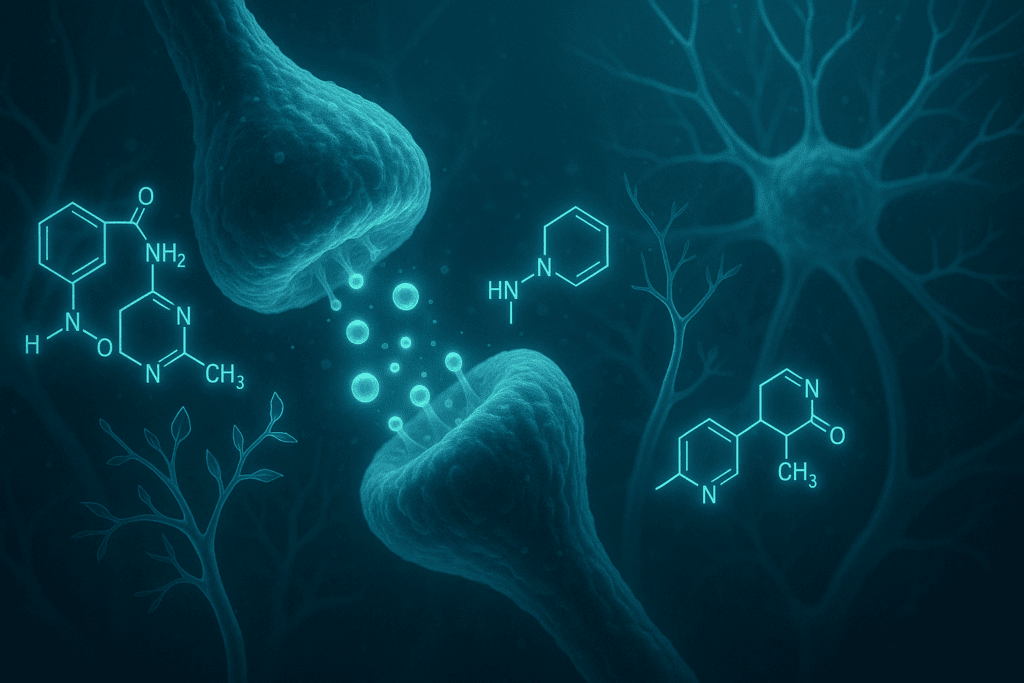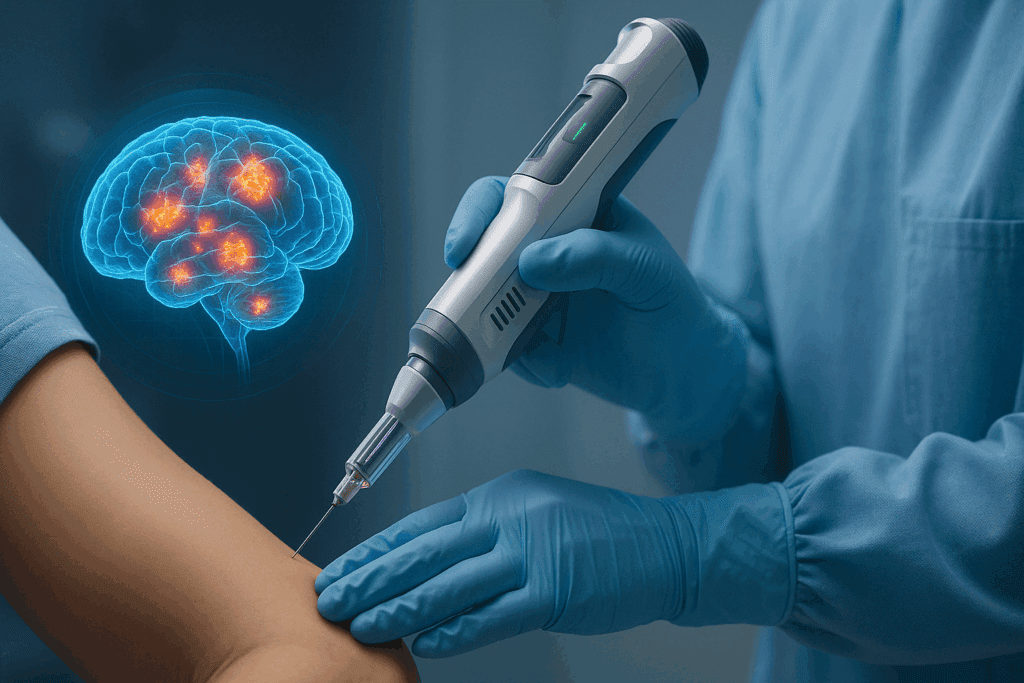In the realm of cognitive health, few challenges weigh as heavily on individuals, families, and medical systems as Alzheimer’s disease and related forms of dementia. These conditions not only erode memory and decision-making but also profoundly impact a person’s identity and independence. With the aging global population, the urgency to discover effective Alzheimer treatment options and innovative dementia therapies has never been greater. Recent scientific advancements have brought promising developments, from new dementia medication formulations to groundbreaking dementia injections. As we explore what the latest treatment for dementia entails, it becomes increasingly clear that we are entering a transformative era in neurodegenerative care.
You may also like: How to Choose the Best Brain Supplements for Adults: Science-Backed Ingredients That Support Focus, Memory, and Mental Clarity
This article offers a comprehensive, medically accurate, and SEO-optimized exploration of new alzheimer medication, memory drugs, and what science says about managing and potentially reversing memory loss. With a clear emphasis on decision-making optimization and cognitive enhancement, we’ll examine emerging treatments, breakthrough drugs, and the real prospects of finding a new cure for dementia. Whether you’re a caregiver, clinician, researcher, or someone concerned about long-term cognitive health, understanding how science is changing the future of memory care is vital.

Understanding Alzheimer’s and Dementia: Why New Treatments Are Urgently Needed
Alzheimer’s disease remains the most common form of dementia, a broad term for conditions characterized by progressive cognitive decline. While memory loss is a hallmark symptom, dementia affects much more than memory—interfering with executive function, mood regulation, communication, and the ability to make decisions. Traditional medications, such as cholinesterase inhibitors and NMDA receptor antagonists, have offered modest symptomatic relief, but they do not halt the underlying neurodegeneration. For decades, families have had to cope with a limited arsenal of treatments, most of which address symptoms without altering disease progression.
As the need for improved therapies grows, researchers have focused on uncovering the biological roots of these disorders. This includes studying beta-amyloid plaques, tau tangles, chronic inflammation, vascular contributions, and metabolic dysfunction within the brain. Understanding these mechanisms has paved the way for more precise and promising interventions. Indeed, the new Alzheimer medication options emerging today are not just symptom managers—they’re disease modifiers. They aim to change the trajectory of Alzheimer’s itself, giving hope to millions who previously had none.
Breakthroughs in New Alzheimer Medication: A Scientific Turning Point
Among the most significant advancements in recent years are new drugs for dementia that target amyloid beta accumulation, one of the pathological hallmarks of Alzheimer’s disease. Aducanumab, approved by the FDA in 2021 under the brand name Aduhelm, was the first of its kind to enter the market. Though its approval was controversial due to mixed clinical trial data, it represented a shift toward disease-modifying approaches. Following Aducanumab, other monoclonal antibodies such as Lecanemab and Donanemab have emerged with more robust efficacy profiles.
These new Alzheimer medication options have shown that reducing amyloid burden in the brain can lead to slower cognitive decline—especially when administered in the early stages of the disease. While these drugs are not cures, they mark the beginning of a new chapter in ad treatment, where the goal is to interrupt the pathological process rather than simply manage its symptoms.
Still, these therapies are not without challenges. Side effects such as brain swelling or bleeding, known as ARIA (amyloid-related imaging abnormalities), can occur. Furthermore, these drugs often come with high costs and require intravenous administration. As a result, they are not yet accessible to all, but ongoing trials are working to refine their safety and delivery methods.

The Promise of New Dementia Medications and Next-Generation Memory Drugs
Beyond monoclonal antibodies, scientists are exploring various mechanisms to treat different forms of dementia, including frontotemporal dementia, Lewy body dementia, and vascular dementia. New meds for dementia in these categories often target inflammation, oxidative stress, mitochondrial dysfunction, and even gut-brain axis imbalances. One exciting area of development is the search for new memory medication that can stimulate neurogenesis or enhance synaptic plasticity.
Blarcamesine (formerly known as ANAVEX 2-73), for instance, is a sigma-1 receptor agonist being studied for its potential to improve memory and cognition in Alzheimer’s and Rett syndrome. Similarly, GV-971—a new drug for memory loss derived from marine algae—has been approved in China and is being tested globally. It is believed to regulate the gut microbiome and reduce neuroinflammation.
These novel therapies underscore a broader truth: the future of Alzheimer treatment and dementia care will be highly personalized. No single “new cure for dementia” will fit all, as each subtype has unique pathology. Nonetheless, the pipeline of new treatments for dementia reflects an exciting convergence of neuroscience, pharmacology, and molecular biology. The field is no longer limited to tweaking neurotransmitter levels; instead, it’s moving toward addressing the root causes of cognitive decline.
Revolutionary Approaches: The Rise of Dementia Injections and Biologic Therapies
As scientific tools become more sophisticated, a new class of treatments is taking shape—biologic therapies administered via injection. One of the most promising formats is the dementia injection, typically involving monoclonal antibodies designed to clear toxic protein build-up or modulate immune responses. Lecanemab, for example, is administered intravenously every two weeks and has shown statistically significant improvements in slowing cognitive decline among early-stage patients.
Research is also underway into subcutaneous delivery systems that could make these injections more patient-friendly and accessible. Other biologics in development aim to target tau protein, which accumulates inside neurons and is associated with disease progression. These biologics could one day be paired with biomarkers to provide a precision medicine approach—administering the right dementia injection at the right time based on individual pathology.
While the administration of such drugs remains a clinical challenge, the very existence of these injectable therapies signals how far the field has advanced. They may soon become part of a routine care model, especially for individuals genetically predisposed to Alzheimer’s or those showing early biomarkers of disease.
Repurposing and Adjunct Therapies: Reimagining What We Already Have
In the race for new medicine for dementia, researchers have also explored repurposing existing drugs—those already approved for other conditions—for use in dementia treatment. Metformin, originally developed for type 2 diabetes, has garnered attention for its neuroprotective effects. Preliminary studies suggest it may support mitochondrial function and reduce inflammation, making it a candidate for new treatments for dementia.
Similarly, GLP-1 receptor agonists such as liraglutide and semaglutide, commonly used for diabetes and weight loss, are being evaluated for their potential cognitive benefits. These drugs have demonstrated the ability to cross the blood-brain barrier and influence pathways relevant to neurodegeneration. While not officially labeled as new memory drugs yet, they represent the innovative ways in which existing pharmacology is being re-evaluated through the lens of cognitive enhancement.
Combining these repurposed agents with lifestyle interventions, cognitive training, or targeted supplements may offer synergistic effects. The concept of multimodal intervention—where multiple therapies address different facets of the disease simultaneously—represents the cutting edge of ad treatment and could be the bridge between current limitations and future success.
Preventive Strategies and Early Intervention: The Shift Toward Proactive Care
In the past, treatment for dementia often began after significant cognitive decline had already set in. Today, however, the paradigm is shifting toward prevention and early intervention. This is particularly relevant when considering how to treat Alzheimer disease before symptoms become irreversible. Advances in neuroimaging and blood-based biomarkers have made it possible to detect early signs of pathology, such as amyloid or tau accumulation, well before clinical symptoms emerge.
As a result, new alzheimer medication regimens are being designed for pre-symptomatic individuals. These strategies include not only pharmacological interventions but also intensive lifestyle modifications, such as personalized nutrition plans, aerobic exercise, stress reduction techniques, and cognitive training. The hope is that early intervention can delay or even prevent the onset of symptoms, improving quality of life for years to come.
Furthermore, the role of digital health tools—like wearable devices and AI-driven cognitive assessments—is growing. These technologies can provide real-time data to optimize treatment plans, track medication efficacy, and encourage patient engagement. In this way, the question of “how can you treat Alzheimer disease?” is evolving into “how can you delay, personalize, and optimize care to preserve decision-making for as long as possible?”
The Neuroscience of Decision-Making and Memory: Enhancing Cognitive Resilience
Decision-making optimization is a central concern for individuals affected by Alzheimer’s and dementia. As cognitive decline progresses, the ability to assess risks, weigh options, and form rational judgments is compromised. New drugs for dementia increasingly aim to preserve or restore these executive functions. The hippocampus and prefrontal cortex—critical regions for memory, focus, and decision-making—are often targeted in new treatments for dementia due to their vulnerability in early stages of disease.
Emerging therapies such as neurostimulatory compounds and synaptic enhancers are being studied for their potential to support cognitive resilience. Some compounds aim to improve long-term potentiation (LTP), the synaptic mechanism believed to underlie learning and memory. Others seek to optimize neurotransmitter balance or reduce excitotoxicity, which can impair synaptic communication. These are not just strategies for boosting memory—they are ways to preserve autonomy, judgment, and daily functional abilities.
Moreover, the integration of neuropsychological assessments into treatment planning helps clinicians tailor interventions. Identifying specific deficits in memory recall, processing speed, or attention can guide the use of targeted therapies. In this context, new medication for memory loss becomes more than a pharmaceutical intervention—it becomes part of a larger ecosystem for cognitive support and enhanced decision-making capacity.
The Road Ahead: Combining Innovation with Ethical, Accessible Care
As we look to the future, it’s clear that Alzheimer’s and dementia care is undergoing a profound transformation. From disease-modifying drugs and precision diagnostics to the first wave of biologic dementia injections, we are witnessing the emergence of a medical frontier. Yet this progress brings ethical and practical considerations. How will these treatments be distributed equitably? Can healthcare systems support the cost and complexity of these regimens? And how do we ensure that patients understand their options fully?
These questions are vital in ensuring that new Alzheimer medication and new treatments for dementia do not remain accessible only to a privileged few. Policymakers, clinicians, researchers, and patient advocates must work collaboratively to create pathways for affordable, informed, and culturally competent care.
Public education also plays a crucial role. Many individuals still associate dementia with inevitability, believing there is nothing that can be done. But the reality, as this article has demonstrated, is far more hopeful. The field is moving rapidly, with each year bringing new medications, novel delivery systems, and better tools for monitoring progress. The message must be clear: dementia is not an unchangeable fate, and early engagement with care options—including the newest memory drugs and Alzheimer treatment strategies—can significantly influence outcomes.

Standalone FAQ: Emerging Innovations in Alzheimer’s and Dementia Treatments
1. How do emerging Alzheimer’s medications differ from traditional treatments?
While older Alzheimer’s treatments like donepezil or memantine focus primarily on managing symptoms, the new Alzheimer medication options go deeper—targeting the biological roots of the disease. For example, several newly approved therapies aim to reduce amyloid-beta plaques in the brain, a hallmark of Alzheimer’s progression. This biological approach offers the potential to slow cognitive decline rather than just delay symptoms. The latest treatment for dementia also emphasizes early-stage intervention, suggesting better long-term outcomes when therapies are started before significant brain damage occurs. As research evolves, this next generation of AD treatment reflects a paradigm shift—from symptomatic relief to neuroprotective strategies with disease-modifying potential.
2. Are there any promising non-pharmaceutical options complementing new meds for dementia?
Yes, alongside new drugs for dementia, researchers are exploring lifestyle and behavioral interventions that complement pharmacological treatments. Cognitive stimulation therapy, music-based memory recall programs, and neurofeedback training are gaining traction for their ability to support brain plasticity. Interestingly, some studies suggest that these strategies may enhance the effectiveness of new memory medications by reinforcing neural pathways. For patients and caregivers, this integrative approach provides a more holistic model of care, especially when paired with new medication for memory loss that targets neural biochemistry. Combining pharmacological and non-pharmaceutical tools may soon become the gold standard in comprehensive Alzheimer treatment.
3. What role do genetics play in how individuals respond to new dementia medication?
Genetic variations, especially those involving the APOE gene, can significantly influence how someone responds to a new Alzheimer medication. For example, individuals with the APOE-e4 allele tend to accumulate amyloid plaques more rapidly, and some new drugs for dementia are designed to mitigate that specific process. Pharmacogenomics—the study of how genes affect a person’s response to drugs—is now being used to tailor dementia injection therapies for maximum efficacy and minimal side effects. This personalized approach may become increasingly common in the future as genetic screening becomes more accessible. Ultimately, the goal is to align the best new medicine for dementia with a patient’s unique biological profile for optimal treatment outcomes.
4. How might the latest treatment for dementia impact early-stage patients differently than late-stage patients?
The efficacy of the latest treatment for dementia is often higher when used during the earliest stages of cognitive decline. New drugs for dementia aim to intervene before irreversible neuron damage sets in, potentially preserving memory and executive function for longer periods. In contrast, late-stage patients may not experience as pronounced benefits, as much of the brain damage has already occurred. However, newer formulations—such as slow-release or targeted-delivery dementia injections—are being developed to bypass blood-brain barriers more efficiently, possibly extending benefits to moderate or even late-stage individuals. The window for early intervention may therefore expand as these advanced delivery systems evolve.
5. Is there any hope for a new cure for dementia, or are current treatments still mostly preventative?
While a definitive new cure for dementia remains elusive, the medical community is cautiously optimistic. Research has accelerated in recent years, driven by breakthroughs in immunotherapy, monoclonal antibodies, and gene editing. Some of these innovations, such as anti-tau and anti-amyloid antibody treatments, are moving us closer to halting or even reversing some aspects of the disease. Though not a full cure, new meds for dementia increasingly aim to delay disease onset or progression more effectively than ever before. Advances in regenerative medicine, such as stem cell therapies, also offer long-term promise as potential contributors to a future cure.

6. How are new memory medications influencing diagnosis and screening practices?
The development of a new memory drug has reshaped how healthcare professionals approach dementia screening. With earlier-stage treatments now available, clinicians are placing more emphasis on identifying cognitive decline as early as possible. Innovations like digital memory tracking apps and blood-based biomarkers are streamlining the diagnostic process, making it easier to determine when someone might benefit from new alzheimers medicine. The shift from reactive to proactive diagnosis aligns with the mechanisms of new medication for memory loss, which are often most effective before noticeable symptoms arise. This evolution highlights the interconnected nature of diagnostics and therapeutic advancements in dementia care.
7. Are there specific risks or ethical concerns with new drugs for dementia?
Yes, while the benefits are promising, new drugs for dementia do come with ethical and clinical considerations. Some treatments targeting amyloid or tau proteins may increase the risk of brain swelling or microbleeds in susceptible individuals. Informed consent becomes more complex as experimental options become available, especially when treating patients with diminished decision-making capacity. There’s also the question of equitable access—many new memory medications come with high price tags, raising concerns about healthcare disparities. Regulatory agencies are working to balance these concerns by implementing conditional approvals, post-market surveillance, and affordability programs. Transparency and patient-centered communication will be essential as this new generation of treatments enters the mainstream.
8. How can caregivers support patients starting a new Alzheimer medication?
Caregivers play a pivotal role in ensuring that a new Alzheimer medication is administered consistently and correctly. Since some therapies—particularly dementia injections or newer oral drugs—may cause temporary side effects like confusion or fatigue, monitoring and reporting these responses is essential. Caregivers can also support adherence by integrating medication schedules into daily routines and using tools like reminder apps. Beyond medication, emotional support and cognitive engagement remain critical, especially as new memory medications can make patients more receptive to therapeutic activities. Education programs tailored to caregivers are now incorporating training on how to manage and optimize these cutting-edge AD drug therapies.
9. Are there any breakthrough delivery methods for new treatments for dementia?
Yes, delivery systems are a major focus of innovation in the development of new treatments for dementia. Traditional oral medications are being supplemented with transdermal patches, subcutaneous injections, and even intranasal delivery systems designed to target the brain more directly. These methods aim to improve bioavailability and reduce systemic side effects, making new drugs for dementia more tolerable and effective. One particularly promising approach is the use of nanocarriers that can cross the blood-brain barrier, ensuring that active compounds reach their targets more efficiently. As these delivery systems advance, they will likely improve both patient outcomes and compliance, especially in those who have difficulty swallowing or managing complex medication regimens.
10. What does the future hold for next-generation memory therapies?
Looking ahead, the future of Alzheimer and dementia care lies in multi-targeted therapies that go beyond current monotherapies. New memory medications are increasingly being designed as part of combination protocols that include anti-inflammatory agents, mitochondrial enhancers, and neuroprotective peptides. AI and machine learning are also starting to play a role, analyzing brain scans and cognitive test results to personalize treatment plans. The integration of wearable tech may allow for real-time feedback on how patients are responding to an ad treatment protocol. While no single new cure for dementia has emerged yet, the convergence of bioengineering, neurology, and data science is pushing us toward increasingly sophisticated solutions—and renewed hope.

Conclusion: Embracing the New Era of Alzheimer Treatment and Memory Care
The landscape of cognitive health is shifting beneath our feet. Where once there were only modest options, there are now groundbreaking possibilities. From cutting-edge biologics and promising dementia injections to new medication for memory loss rooted in precision medicine, the progress made in recent years is nothing short of revolutionary. These treatments offer more than symptom relief—they present a vision of slowing, altering, and potentially even preventing the cognitive deterioration that has long defined dementia.
For anyone asking, “how can you treat Alzheimer disease in today’s world?”, the answer lies in a multi-pronged approach: disease-modifying drugs, early detection, preventive care, and the holistic support of decision-making and cognitive function. As new memory medication continues to emerge, so too does the need for informed, ethical, and personalized application of these therapies.
The journey is far from over. But the convergence of science, technology, and compassionate care is pointing us toward a future where memory loss no longer means losing oneself. With each new Alzheimer medication and every new cure for dementia explored, we come one step closer to rewriting the story of aging minds—toward a narrative not of inevitable decline, but of resilience, renewal, and hope.
Was this article helpful? Don’t let it stop with you. Share it right now with someone who needs to see it—whether it’s a friend, a colleague, or your whole network. And if staying ahead on this topic matters to you, subscribe to this publication for the most up-to-date information. You’ll get the latest insights delivered straight to you—no searching, no missing out.
Further Reading:
Can Alzheimer’s Disease Be Prevented?
Medications for Memory, Cognition and Dementia-Related Behaviors


